Ode on Indolence1 |
|
‘They toil not, neither do they spin.' 2
One morn before me were three figures seen,
With bowèd necksThe figures' heads were down. The accent over the "e" means it is inflected. So instead of being one syllable, the word is two., and joinèd handsThey were holding hands. The accent over the "e" means it is inflected. So instead of being one syllable, the word is two., side-faced;Their faces were in profile. The speaker could not see their whole face, just one side because they are turned away. They are perpendicular to him. Picture it like a face on a coin.
 A Grecian coin, after 190 B.C.
A Grecian coin, after 190 B.C.
And one behind the other stepp'dThey stepped or walked together. serene,They appeared calm and tranquil.
In placidsimple sandals,Greek sandals with criss crossed straps.
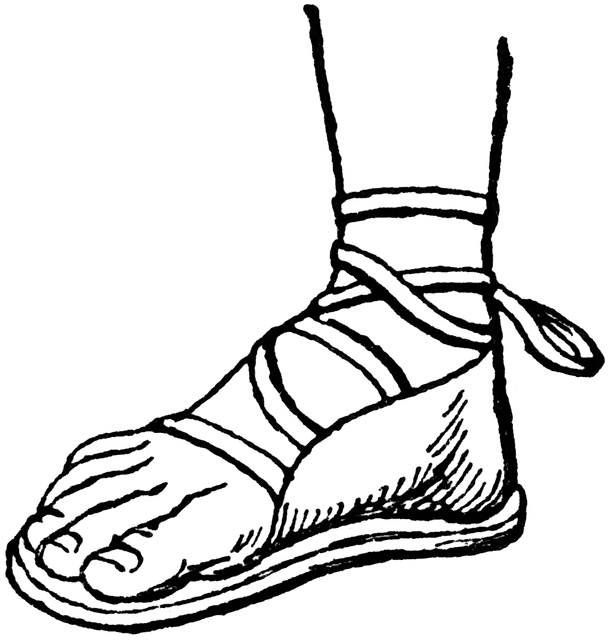 An example of Grecian sandals. and in white robesLight, flowy draping on the body.
An example of Grecian sandals. and in white robesLight, flowy draping on the body.
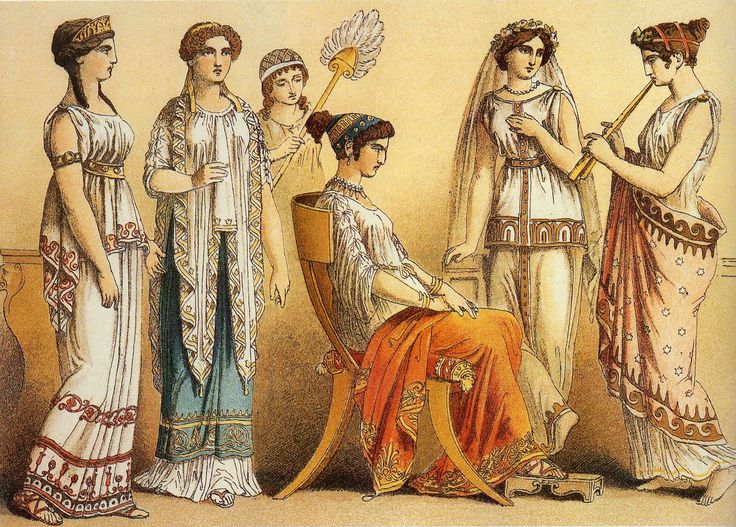 Some examples of Grecian robes. graced;
Some examples of Grecian robes. graced;
They pass'd,They passed the speaker. like figures on a marble urn,The speaker is seeing them like figures drawn on an urn. They're in a line walking perpendicular to the speaker, which is how he sees them in profile. This is also a simile.
 A traditional Grecian urn.3
A traditional Grecian urn.3
When shifted round to see the other side;
They came again; as when the urn once more
Is shifted round,The figures appear to be coming back like figures in an urn would if the urn was rotated. the first seen shadesDisembodied spirits. return;
And they were strange to me, as may betideHappen or occur.
With vases, to one deep in PhidianThis refers to Phidias, a sculptor of ancient Greece. It is believed he oversaw the construction of many great pieces of Grecian history, including the statue of Zeus in Olympia.
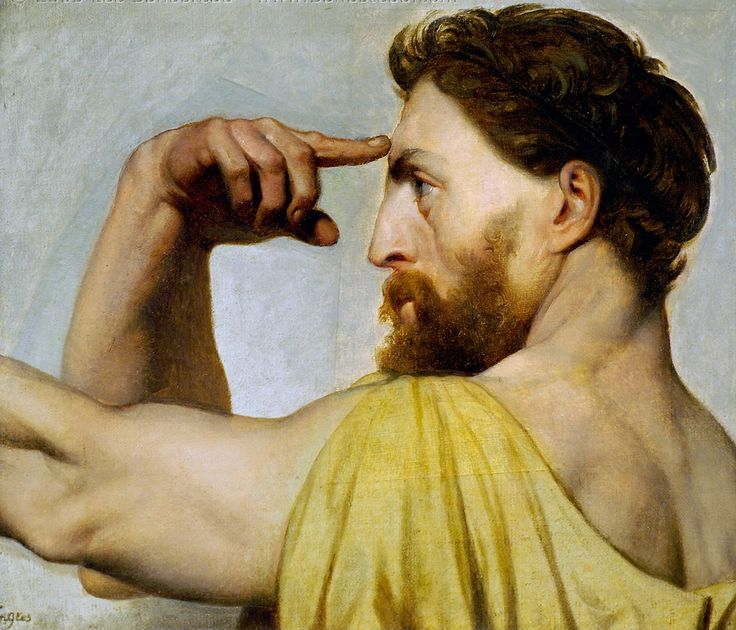 "Study for Phidias" by Jean-Auguste-Dominique Ingres, 1827. lore.
"Study for Phidias" by Jean-Auguste-Dominique Ingres, 1827. lore.
How is it, Shadows!The speaker speaks directly to the figures that I knew ye not?
How came ye muffledThe speaker questions how they were so quiet. in so hush a mask?He also wants to know why they keep their faces turned.
Was it a silent deep-disguisèdConcealed or hidden. plotThe speaker thinks they did it on purpose and planned to disturb him.
To steal away, and leave without a taskThe speaker is questioning why they would try to steal away whatever he is trying to do, or his task.
My idleEmpty or vacant. He does nothing with his days. days? RipeComing at what is seen as a fitting time; timely. was the drowsy hour;
The blissful cloudJoyous haze. He feels enwrapped in joy. of summer-indolenceA state of rest or ease. The speaker is not too concerned with anything so he feels unburdened and light.
Benumb'dDeprived of strength or motion. The feeling of no pressures or worries makes the speaker close his eyes and relax. my eyes; my pulse grew less and less;
Pain had no sting, and pleasure's wreathThis is a metaphor. The speaker is saying that if pleasure was depicted as a wreath, there would be no flowers on it. It isn't a bad "wreath," or pleasure; it just isn't exciting.
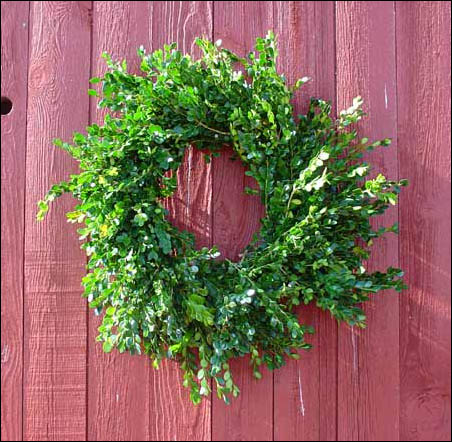 A plain wreath. no flower:
A plain wreath. no flower:
O, why did ye not melt,Disappear. He wants the figures to leave him to his idleness and not make him think or care. and leave my sense
Unhaunted quite of all but—nothingness?The speaker calls his idleness nothingness. By being there, the spirits are ruining the feeling of "nothingness."
A third time pass'dThis is the third time he's seen them. they by, and, passing, turn'dFinally, they lok at the speaker.
Each one the face a moment whiles to me;Each passing figure turns to face him.
Then faded,Then they disappeared. and to follow them I burn'dThe speaker now wants to follow them.
And ached for wingsHe wants to go with them badly and wishes for any way to follow. A famous figure who also wished for wings may come to mind— Icarus.
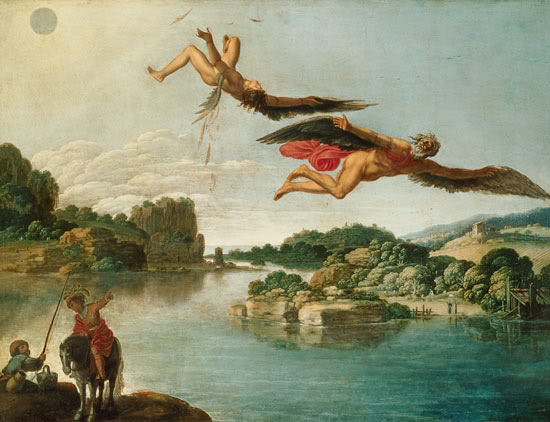 "The Fall of Icarus" by Carlo Saraceni, 1606., because I knew the three;4
"The Fall of Icarus" by Carlo Saraceni, 1606., because I knew the three;4
The first was a fair Maid, and Love her name;
The second was Ambition, pale of cheek,
And ever watchful with fatiguèdTired. When read aloud, it has three syllables because the accent over the "e" makes it a syllable. eye;
The last, whom I love more, the more of blame
Is heap'd upon her, maiden most unmeek,—Poesy is the most emboldened and disruptive to the speaker.
I knew to be my demon Poesy.Poesy is poetry. Clearly, the speaker knows Poesy well and is plagued by her. She is unbending and makes poets work to acquire her. Poetry is disrupting his peaceful day of nothingness.
They faded, and, forsooth!In truth, truthfully. I wanted wings:
O folly! What is Love?Love here is capitalized, giving it extra importance. The speaker is talking directly about love, personifying it or giving it a character. He cannot find Love, which means love eludes him. and where is it?
And for that poor Ambition!Ambition is also capitalized, giving it additional importance so the readers will notice it. The speaker is talking directly about ambition, personifying it or giving it a character. Ambition is the will to do tasks or things. Because the speaker is indolent, or lazy, he has no ambition. it springs
From a man's little heart's short fever-fit;The speaker can feel ambitious for a few moments but then loses the will.
For Poesy!—no,—she has not a joy,—
At least for me,For the speaker, poetry is not a joy, it's work.—so sweet as drowsy noons,He much prefers afternoons spent half-awake.
And evenings steep'dCoated or soaked in, almost in excess. Most people associate steeping with tea.
 A teabag steeping in water to make tea. in honey'd indolence;Literally, it means coated in honey. However, here should be taken as sweetened, making the indolence more appealing.
A teabag steeping in water to make tea. in honey'd indolence;Literally, it means coated in honey. However, here should be taken as sweetened, making the indolence more appealing.
O, for an age so shelter'd from annoy,He would love to be sheltered, or never bothered, by Love, Ambition, and Poesy. At this point, The speaker is talking about actual love, ambition, and poetry; he feels plagued by them as a poet. This is figurative language.
That I may never know how change the moons,
Or hear the voice of busy common-sense!The voice of common sense bothers him becaue it is nagging the poet to get back to work and write poetry.
And once more came they by:The figures have returned again.—alas! wherefore?Literally, "for what reason?"
My sleep had been embroider'dHis sleep was made splendid by his dreams. While "embroider" can mean needlework, it can also mean to beautifully improve.
 This thread work has beautifully improved the cloth. So this embroidery has embroidered this cloth. with dim dreams;He begins to describe his dreams.5
This thread work has beautifully improved the cloth. So this embroidery has embroidered this cloth. with dim dreams;He begins to describe his dreams.5
My soul had been a lawn besprinkled o'er
With flowers,He imagines his sleeping soul as a lawn of flowers.
 Field of flowers. and stirring shades, and baffled beams:Now his soul is dappled in sun and shadow.
Field of flowers. and stirring shades, and baffled beams:Now his soul is dappled in sun and shadow.
 A dappled light painting.
A dappled light painting.
The morn was clouded, but no shower fell,Clouds hung about in the dream but it did not rain.
 A cloudy morning.
A cloudy morning.
Tho' in herHe personifies his dream morning. lids hung the sweet tears of May;The clouds do contain rain; it just isn't falling.
The open casement press'd a new-leaved vine,The open window, which opens outwards like a door, is opened on a vine.
 The pressed vine.
The pressed vine.
Let in the budding warmth and throstle's lay;The throstle's call.
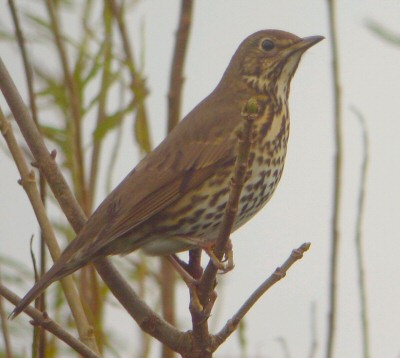 A Song Thrush, or Throstle.
A Song Thrush, or Throstle.
O Shadows! 'twas a time to bid farewell!It's time for the figures to leave.
Upon your skirts had fallen no tears of mine.This time, the speaker is ready for them to leave. He isn't shedding any tears at their departure.
So, ye three Ghosts, adieu! Ye cannot raise
My head cool-bedded in the flowery grass;The figures did not succeed in getting his head off his pillow of grass.
 Asleep in the grass, enjoying nothingness.
Asleep in the grass, enjoying nothingness.
For I would not be dieted with praise,The speaker does not follow Poesy, or go write poetry, because he does not want to fed praise.
A pet-lamb in a sentimental farce!He thinks the praise is fake and unnecesary. Besides, he values doing nothing more than praise.
 Two children and their pet lamb.6
Two children and their pet lamb.6
Fade softly from my eyes, and be once more
In masque-like figuresHe wants them to go back to the urn and leave him to enjoy the peace.
 Figures on an urn. on the dreamy urn;
Figures on an urn. on the dreamy urn;
Farewell! I yet have visions"Visions" has double meaning. He tells the ghosts, or visions, to leave because he has visions, or daydreams, for the day and night. he does not need them. for the night,
And for the day faint visions there is store;
Vanish, ye Phantoms! from my idleOne last image of nothingness. spright,
Into the clouds, and never more return!7
Notes
1. Composed in Spring of 1819 but wasn't published until 1848.
In a letter to George and Georgiana, Keats described his recent lazy desires: "This is the only happiness; and is a rare instance of advantage in the body overpowering the Mind."
Having been published after all the other odes, this is normally the least known of the six odes. Critics generally agree that it is not as fully developed as the other five.
2. This line is from the Bible and is found in two places. The first is Luke 12:27: "Consider how the wild flowers grow. They do not labor or spin. Yet I tell you, not even Solomon in all his splendor was dressed like one of these." The second is Matthew 6:28: "And why do you worry about clothes? See how the flowers of the field grow. They do not labor or spin." Both passages promote relaxing and letting go of stress and concerns.
3. This connects to "Ode on a Grecian Urn."
4. The speaker personifies Love, Ambition, and Poesy, calling them women from the urn. This sets up figures for the speaker to react towards.
5. In the beginning of the ode, there is little imagery. Only when the speaker talks about what he saw when the figures were gone do images begin appearing. This is no accident; the presence of Love, Ambition, and Poesy ruins his imagination. He can only create when they are not there.
6. At the time, Keats had recently written a sonnet titled "On Fame," which stated how much he detested fame's flightiness. His main recommendation is to bid fame "Adieu!," as the speaker does at the beginning of this stanza to the figures, because if a person is worthy of fame, fame will follow them..
7. As the poem concludes, the speaker wants Love, Ambition, and Poesy to never return. However, the speaker cannot exist among his "dim dreams" forever. Eventually, he must do something. Keats' letter—quoted in "Note 1"—says how much he loves the state of nothingness. But even Keats knew he had to continue writing. It is good he did, because by working and editing more, we now have the six "Great Odes."